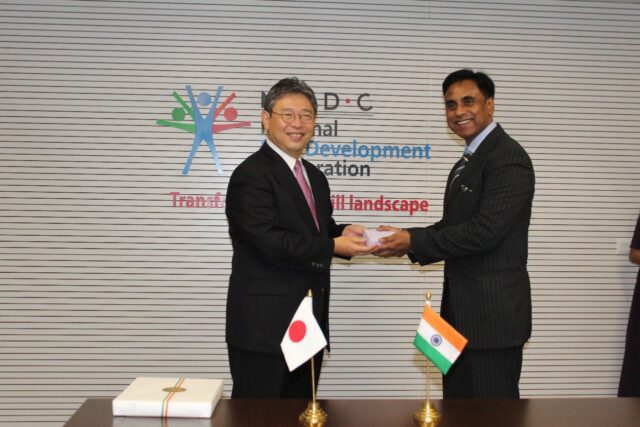India and Japan held the 3rd edition of the Joint Working Group (JWG) meeting on Specified Skill Workers (SSW) in hybrid format on Tuesday, the 2nd of August, 2022 in New Delhi. Shri Anurag Bhushan, Joint Secretary (OIA-I), Ministry of External Affairs (MEA) and Dr. K.K. Dwivedi, Joint Secretary, Ministry of Skill Development & Entrepreneurship (MSDE) led the Indian delegation. The Indian delegation also included representatives of the National Skill Development Corporation (NSDC). The Japanese delegation was led by Mr. Nakagawa Tsutomu, Assistant Vice Minister, Immigration Services Agency, and comprised representatives from the Ministry of Foreign Affairs (MOFA), Ministry of Health, Labour and Welfare (MHLW), Ministry of Agriculture, Forestry and Fisheries (MAFF) and Japan Tourism Agency. Officials from respective Embassies also participated in the JWG Meeting on Specified Skilled Workers.
In January 2021 India and Japan signed a Memorandum of Cooperation (MoC) on Specified Skilled Workers (SSW) with the aim to promote the movement of skilled workers from India to Japan. This Memorandum of Cooperation covered 14 categories of specified skills under which those skilled workers from India who met the skills requirement and Japanese language tests were eligible for employment in Japan on a contractual basis. The 14 specified industry fields included nursing care, building cleaning, electric and electronic information, material processing, industrial machinery manufacturing, construction, shipbuilding and ship-related industry, automobile maintenance, aviation, lodging, food and beverages manufacturing, agriculture, fisheries and food services industry. It was agreed that Japan would grant these workers the status of “specified skilled worker”. The meeting in January 2021 concluded with the aim of setting a Joint Working Group (JWG), which would comprise officials from both countries, to work out operational details and smooth implementation of the SSW programme.
Building on the same lines as January 2021, the 3rd edition of the JWG meeting, marked the existing cooperation between India and Japan under SSW and both nations agreed that there was considerable potential to increase the number of SSW workers from India to Japan. In this context, delegates from both countries held discussions on ways and methods to further enhance the implementation of the SSW programme by identifying challenges in the existing system.
The focal issues, discussed during the meeting, were demand-supply matching including the use of digital technology and platforms, raising the number of test centres in India, expanding the sectors of implementation, raising awareness about the SSW programme in India, Japanese language promotion in India, and setting up of a framework for programme monitoring, as reported by the MEA.
The Japanese side announced that, along with the existing cooperation under nursing/caregiving, the SSW will be also expanded to cover the agriculture sector in India. The Indian side welcomed this announcement and addressed the expansion of the SSW into other sectors as well.
Both India and Japan agreed to hold the next edition of the JWG meeting at a date which is mutually convenient for both, in the near future.









